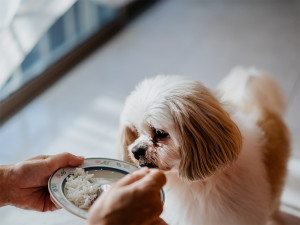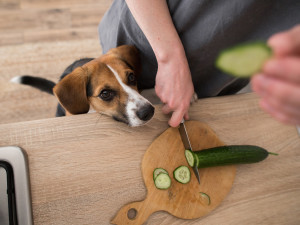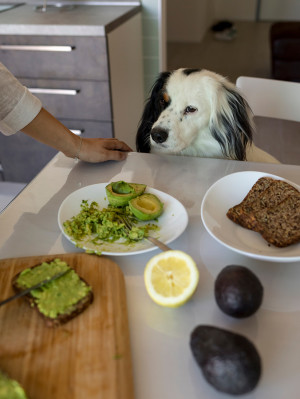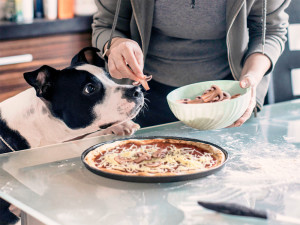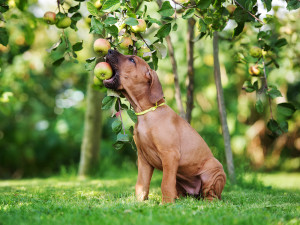Can Dogs Eat Tuna?
It’s best to avoid feeding your pup this fishy snack
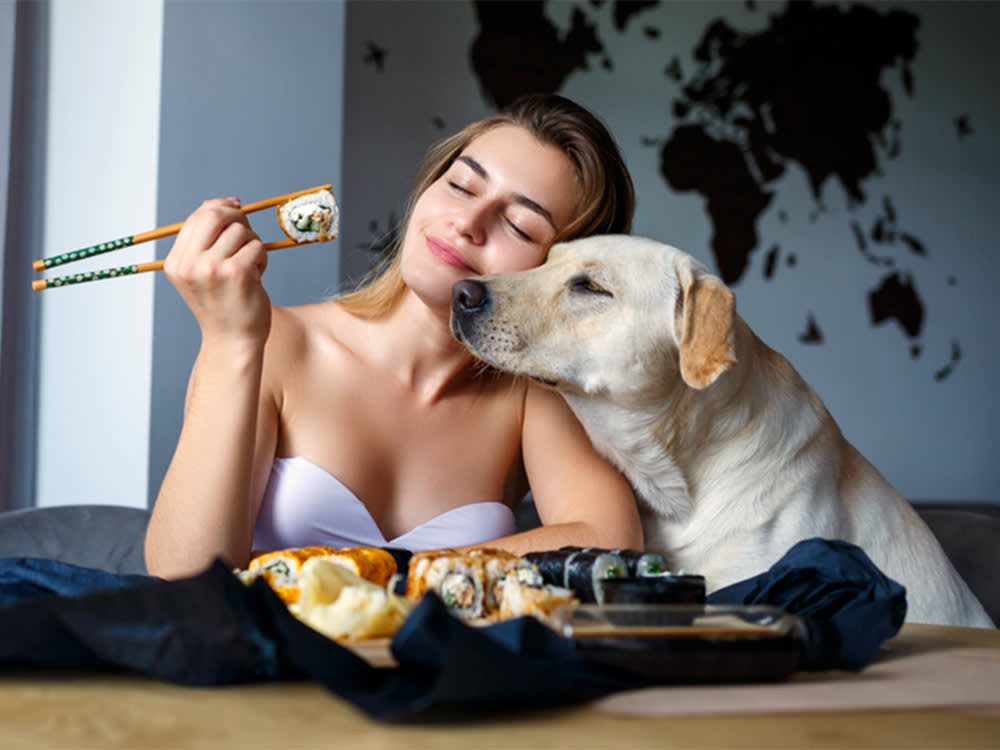
Share Article
While a penchant for tuna and other fish may be more commonly associated with cats, you may have found yourself wondering whether you can give your dog a spoonful of canned tuna, a bite of sushi or some table scraps from your tuna steak dinner. Dogs’ noses tend to go wild when fish is around due to its strong scentopens in new tab, so their eagerness to share might have you believing that you should give them a taste – but tuna can be dangerous to dogs in large quantities, and some varieties are a big no-no.
Dogs can have tuna in very small amounts as a rare treat, but it shouldn’t be their main course and there are a number of health risks associated with the saltwater fish. Above all else, it is most important to ensure your dog’s main diet is complete and balanced and that any treats or snacks are kept to a minimum. Read on to learn more about whether dogs can eat tuna before you give into those puppy dog eyes.
Nutrition facts about tuna for dogs
There are many health benefits of eating fish that apply to both humans and animals. Proponents of Mediterranean-style dietsopens in new tab include fish as a good source of lean protein as well as essential fatty acids, which promote heart health and reduce inflammation.
But tuna is a different kettle of fish (pardon the pun). “The levels of mercury – a heavy metal that enters bodies of water – are much higher in tunaopens in new tab compared to other kinds of fish,” says Hannah Chial, registered veterinary nurse and lecturer in veterinary nursing at Hartpury University. As they eat smaller prey with trace amounts of contaminants, “Larger fish that live longer (such as tuna) accumulate more mercury in their tissues over time,” she explains.
“Your vet can assist you with the amount of tuna that is suitable for your pet’s weight and medical needs,” says Hannah. “But if a dog eats too much tuna it could lead to a build-up of mercury, which can result in mercury poisoning and cause potentially fatal health issues.” Hannah explains that you should take your dog to the vet immediately if they’ve consumed a large quantity of tuna or shows any of these symptoms of mercury poisoning:
hair loss
blindness
loss of coordination or tremors
Is tuna safe for dogs?
When offering your dog a treat or table scrap, always be sure to offer it in a form that is safe and easy for them to chew and swallow. Large pieces of whole fish can pose choking hazards, especially if they contain bones or pieces of tough skin. These materials can also cause digestive upset including vomiting and/or diarrhoea. If you are going to give your dog an offering of tuna, always ensure it’s a small bite-sized piece with the bones and skin removed.
It’s also important to think about the other ingredients we cook with, which could be toxic to dogs. Skip feeding your dog fish that may have been cooked with garlic, onions, lots of salt or other ingredients that could be unhealthy or toxic for them.
“Start by introducing a small portion so that you can monitor your pet’s reaction to the new food. Any sign of an allergy should be evident within 24 hours,” says Hannah.
Tuna comes in lots of different forms, so here’s a breakdown of which ones are safe in small quantities, and which are definitely not.
Canned tuna
Different sourcesopens in new tab of tuna have different levels of mercury, with pre-cooked canned light tuna having much lower levels of mercury than uncooked varieties. However, canned tuna is often high in salt and preserved in different liquids, which come with their own set of problems.
Tuna in brine: although a very small amount of tuna in brine shouldn’t be toxic, it’s best to avoid feeding it to your pup. It contains a lot of salt, which is bad for dogs and ingesting too much can cause sodium poisoningopens in new tab.
Tuna in sunflower oil: sunflower oil is lower in saturated fat than other oils and contains omega-6, which can be beneficial for your dog’s health if they eat a little. However, consuming too much of any oil can contribute to unhealthy weight gain and inflammation.
Tuna in spring water: “Ideally you should feed tuna in water rather than brine or oil,��” says Hannah. This is because tuna canned in spring water has less salt and fat compared to other kinds of canned tuna.
Sushi and raw tuna
Cute as the idea is of feeding your pup sushi from chopsticks, you should definitely skip sharing that slice of raw tuna sashimi. Additionally, you should never feed your dog bluefin tuna (one of the most prized types of tuna used by sushi chefs), as it contains high mercury levels.
Raw tuna also contains an enzyme called thiaminase, which inactivates thiamine, an essential vitamin also known as vitamin B1. Dogs who eat large amounts of raw fish can develop thiamine deficiencyopens in new tab as a result. This can lead to weight loss, weakness and heart failure. But the thiaminase enzyme is deactivated when the fish is cooked, and is also not a concern when only small amounts of fish are eaten on occasion.
Tuna steak
“Tuna steaks should be thoroughly cleaned, deboned, filleted and cooked before serving it to your dog,” says Hannah. “Feeding undercooked tuna (or any other meat) poses a risk of transmitting harmful bacteria such as Salmonella. Also ensure not to cook the tuna with any spices or additives. The fins, tail, and head of the tuna fish should be avoided as they can cause trauma to the digestive system.”
Dog food with tuna
“Tuna is included in some dog foods as it is high in protein and fatty acids. These diets will be specially formulated and pose no risk to your pet’s health,” says Hannah.
The bottom line: can dogs eat human food?
Most dogs can eat human food, as long as you verify those foods are safe and non-toxicopens in new tab for them. It’s best to keep these as occasional small snacks or treats that you share with your dog, rather than a major component of their regular diet. Snacks and treats should make up less than 10 percent of your dog’s calories for the day, and you should reduce their meals to account for extra calories from snacks throughout the day.
Some dogs may not tolerate human foods well due to a sensitive stomach or other health conditions. Dogs with diabetes should avoid foods high in sugar; dogs with obesity can be fed low-calorie snacks like green beans; dogs with heart issues should stay away from saltier treats. Always discuss new snacks with your veterinarian before starting them, especially if your dog has health issues or is on medications. Contact the Animal PoisonLineopens in new tab if you suspect your dog may have eaten something toxic.
Other human foods that are safe for dogs
Eggs are a great alternative protein source to tuna, as long as they’re cooked simply without additional ingredients.
Peanut butter has healthy fats and protein that are good for your dog, and it’s safe for dogs to have both smooth and crunchy peanut butter.
Yoghurt is safe and healthy for dogs, and most absolutely love it.
Some fruits and vegetables are safe for dogs, including celery, tomatoes, pears and apples.
Other human foods that are dangerous for dogs
Avocado can cause digest upset in dogs and should be avoided.
Raisins and grapes are toxic for dogs, too.
Mushrooms are a mixed bag, so make sure you do your research.
Frequently asked questions
Can dogs eat tuna?
Dogs can very eat small amounts of canned or cooked tuna as an occasional snack or treat, but you should never feed them raw tuna.
How much tuna can a dog eat?
Tuna and other treats or table scraps should be limited to less than 10 percent of a dog’s total diet, and it should only be offered very occasionally, not daily.
Is tuna safe for dogs?
Tuna can pose a risk of mercury poisoning if dogs consume too much, so make sure you limit their intake to a very small amount.

Ro Elfberg
Ro previously served as Kinship’s Senior Editor. Now a freelancer, she has written and copy-edited for British Vogue, Glamour, DICE and of course, Kinship. When she’s not being manipulated into dishing out Dreamies to Kobe the cat, she spends her free time trying to convince her snake, Butters, to wear a tiny hat.
Related articles
Can Dogs Eat Tomatoes?
Bite-size pieces of ripe, red tomatoes are safe – but you should skip tomato sauce
Can Dogs Eat Cucumbers?
That cucumber crunch is irresistible. Learn if your dog can get in on that action
Can Dogs Eat Avocado?
Hold the avo toast, please
Can Dogs Eat Honey?
They shouldn’t exactly have their paw in the honey jar constantly, but the sweet stuff can be beneficial in some cases
![Women in the kitchen baking mushroom pizza with her dog.]()
Can Dogs Eat Mushrooms?
Your dog is a fun-gi, but be careful which shrooms they eat
![Ridgeback puppy eating an apple from a low-hanging tree]()
Can Dogs Eat Apples?
Yep – this fibre-filled fruit is a healthy treat for your dog



